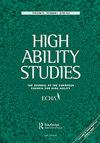资优学生人格类型对精神症状的预测
IF 1.8
4区 教育学
Q2 EDUCATION, SPECIAL
引用次数: 3
摘要
摘要本研究考察了资优学生的人格类型是否能预测其精神症状,以及资优类型和性别是否能调节人格与精神症状之间的关系。采用Murphy-Meisgeir儿童类型指标和明尼苏达青少年多相人格量表对232名韩国资优中学生的人格类型和精神症状进行了测量。结果发现,内向可以预测除轻躁狂以外的所有症状。直觉可以预测精神变态和精神分裂症的症状,感觉可以预测抑郁症和转化性歇斯底里的症状。知觉和轻躁之间,判断和抑郁和社会内向之间也发现了其他的预测关系。具有内向和直觉型人格类型的创造性天才学生比具有相同人格类型的学术天才学生表现出几个症状。在性别上,内向型男性比内向型女性更容易出现精神症状,而感性女性比感性男性更容易出现轻躁症。本研究支持人格特征在一定程度上解释了资优学生心理困扰的迹象。进一步的研究需要检查两者之间的因果关系,并证实目前涉及青少年的结果。本文章由计算机程序翻译,如有差异,请以英文原文为准。
Predicting psychiatric symptoms by personality types for gifted students
ABSTRACT This study examined if personality types of gifted students predicted their psychiatric symptoms and if the type of giftedness and gender moderated the relationship between the personality and psychiatric manifestations. The Murphy-Meisgeir Type Indicator for Children and the Minnesota Multiphasic Personality Inventory-Adolescent were used to measure the personality types and psychiatric symptoms of 232 gifted middle-school students in South Korea. Results found that introversion predicted all of the symptoms but hypomania. Intuition predicted the symptoms of psychopathic deviance and schizophrenia and feeling predicted those of depression and conversion hysteria. Other predictive relationships were found between perceiving and hypomania and between judging and depression and social introversion. Creatively gifted students with introverted and intuitive personality types exhibited several symptoms than were academically gifted students of the same personality. Regarding gender, introverted males were more vulnerable to psychiatric symptoms compared to introverted females, and perceptive females had a higher chance to show hypomania than perceptive males. This study supported that personality characteristics partly accounted for the indications of psychological distress among gifted students. Further studies need to examine causal relationships between the two and to corroborate the current results involving adolescents.
求助全文
通过发布文献求助,成功后即可免费获取论文全文。
去求助
来源期刊

High Ability Studies
Multiple-
CiteScore
4.80
自引率
11.10%
发文量
7
期刊介绍:
High Ability Studies provides a forum for scholars in a variety of disciplines associated with the development of human abilities to their highest level. It is a medium for the promotion of high ability, whether through the communication of scientific research, theory, or the exchange of practical experience and ideas. The contents of this journal are unique in reflecting concerns and recent developments in this area from childhood and across the whole life span in a variety of contexts. Far from being restricted to the traditional focus on high-level cognitive development, it also presents investigations into all other areas of human endeavour, including sport, technology, the arts, business, management and social relations.
 求助内容:
求助内容: 应助结果提醒方式:
应助结果提醒方式:


